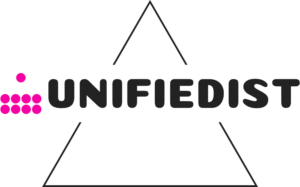Social Media and Link Building: Strategies to Use Social Media to Earn Quality Links
Share
Social media and link building should be your priority if you are new to SEO and struggling to get quality backlinks. Social media has become one of the crucial platforms that help in link building. How will you get links to your website from popular social media platforms?
Moreover, around 4.89 billion active social media users worldwide were reported in 2023. However, it is also an excellent opportunity for strategic social media link-building.
Social media is often considered pointless for links because links from social media platforms are unfollowed. But, the primary purpose of link-building through social media is to get links outside the social networks through the people inside them.
This article will explore the relationship between social media platforms and link building, including strategies to encourage social sharing and engagement for link acquisition.
So let’s get started,
What is Link Building?
Link building is bringing other websites to link back to your website, and it is an essential aspect of SEO. It helps search engines rank your pages SERPS. The website with the most high-quality votes stands the most excellent chance of ranking highly for its key terms.
According to Google’s algorithm, gaining backlinks and a healthy link profile accounts for most of a site’s ranking. So, what is a link? A link or a hyperlink is a connection between two different pages. You can refer people to a page, post, image, or another online object with a link.
A link in HTML coding language has the following features,
-
HTML provides an anchor tag, which transfers control from one page to another.It is a pair tag.
-
It has both start and end tags.
-
The href is an attribute of the anchor tag.
-
It holds the URL of that page or site we want to visit.
-
Using the <a> element, you can add hyperlinks to your web page.
-
The text is displayed as the hyperlink goes between the opening and closing tags.
-
The <a> element has an attribute href, the location to link to.
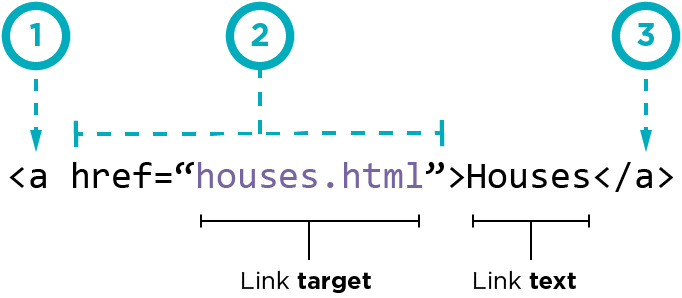
Image Source – studio.code
.
The Importance of Social Media in Link Building
You got an idea about links and link building; now let’s see how social media helps to boost organic traffic through link building. You can’t expect to receive a link from a strange person by asking for it immediately.
Link building is about relationships; we can build links to our site by forming and cultivating these relationships. We get those relationships through social media, including Facebook, LinkedIn, Twitter, Pinterest, YouTube, and blogging. It’s where we show our business personality.
According to Statista, the number of social network users of social media platforms worldwide in 2019 and 2023 has increased.
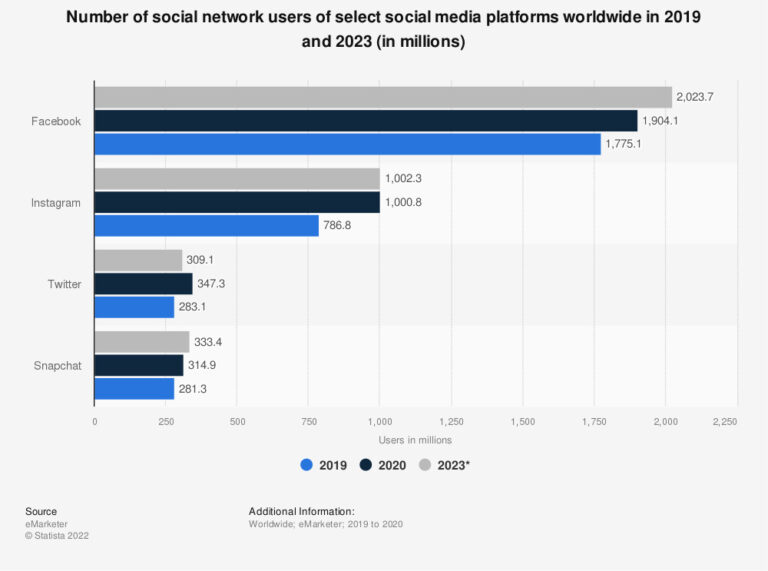
Image Source – Statista
Now let’s see the fundamentals of using a social media-focused approach for link acquisition and attraction.
What is Social Linking?
Social linking often means using social media channels to promote content that inspires social shares with links. Examples of social links include a Facebook status update, Tweet, a LinkedIn post, or a Pinterest pin that includes a link to the promoted content.
i.e., social shares with links = social links
Social media links allow businesses to interact directly with their customers. You can create a strong sense of customer service and build loyalty by responding to comments and messages.
Social media links are significant tool for all type of businesses. By including them on your website, you can reach a wider audience, improve your SEO, and create stronger customer relationships.
Social media does not directly impact search rankings, it can help with traffic in other ways. Social signals and backlinks play a role as a ranking factor, We can use social media to improve link building; specifically, it can help in the following areas:
-
Outreach
-
Link prospecting
-
Content ideation
-
Content promotion
Social channels are also used to promote content to communities, including bloggers and journalists who may notice and link to the promoted source. Those are not social links but are inspired by content promoted through social channels.
What are the Types of Social Links?
Social sharing links are those clickable social media icons on ebooks, blog posts, and other web pages. When a viewer clicks on one, she is sent to a social media site with an update pre-populated with your content.
Additional levels of link shares and overall propagation because of a focus on awareness, branding, and reach.
Some other essential social link characteristics or types might include:
-
Content shared on social channels that include a link.
-
Links within feeds (RSS)
-
Clean links that pass PageRank
-
Links contained on social profile web pages
-
Nofollow links
-
Shortened links/URLs
Social media strategy can be highly beneficial for link building. Now let’s dive into the top ways to utilize link building with social media.
Top Ways to Use Social Media in Your Link-Building Strategy
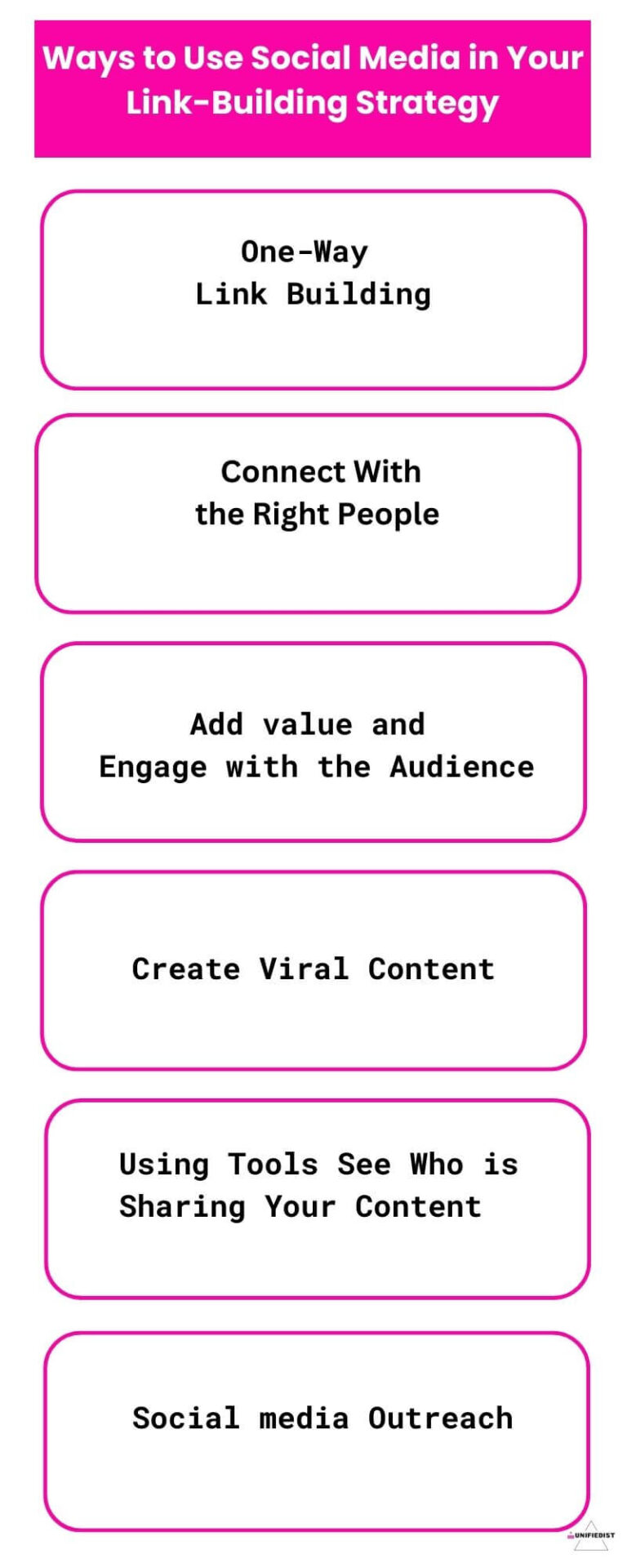
#1. One-Way Link Building
Google link-building guidelines describe excessive link exchanges as a link scheme. The Practice ‘link to me, and I will link to you’, can earn you severe penalties from search engines.
An effective way to link is through one-way link-building techniques. What is one-way link-building technique? One-way links are links you receive without needing to link back to the source of the backlink. It is a fool-proof method of earning one-way links by creating high-quality content.
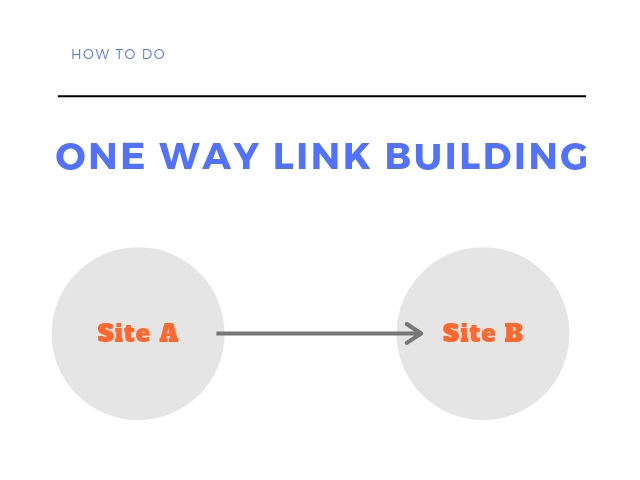
Image Source – digital nuisance
So try to develop high-quality content to get inbound links; a good-quality backlink is a sign of endorsement because it does not come about due to reciprocity. Search engines prioritize this link-building strategy, so that you must submit high-quality content to social media sites like LinkedIn, Quora and Tumblr.
The same applies to LinkedIn, Facebook, and Google community networking groups. If they post the content, they will place a link to your site. The chances of their followers clicking on the link are very high because they like your content.
#2. Connect With the Right People
Blogger or Influencer backlinks from social media can generate a lot of traffic. So you should be able to determine which one sync with your brand. For example, A digital marketing blogger or influencer like Neil Patel will be your best bet if you are in the digital marketing industry.
You should be able to break down your list to a few bloggers or influencers, and then the next step is to connect and reach out to them. You must engage with them to develop relationships.
#3. Add value and Engage with the Audience
Social media is a crucial sharing channel for content. Once your content is out there and generates engagement via social shares, it gets traffic. Moreover, traffic is a metric that Google cares about; Social sharing provides a form of social proof, giving greater credibility and trustworthiness to your content.
The more likes and shares you get, the more possibilities for many people to read the entire content. Also, there are possibilities for the content creators to share the link of their profile, which leads to automatic link building without too much effort.
Your audience, the number of likes, and shares all build social proof, which, in turn, gives credibility to your content and can make it appear more trustworthy. This gives you a higher chance of gaining good-quality links.
#4. Create Viral Content
Why is viral content important? A significant part of viral content is connecting with others outside your target audience by sharing your posts or images. This means you must make viral content to impact those fans and followers.
The most vital point in favor of viral content is shareability. People love to share engaging content.
What makes online content viral? some interesting points on what makes content go viral.
Some content tricks that will help you to go viral:
-
Create quality content.
-
The content must be short and crisp.
-
Post it at the right time.
-
Get the right emotions.
-
Leverage the power of video marketing.
-
Provide a clear CTA with every post.
-
Create interactive and share-worthy content.
-
Use different types of content.
Always remember that you aim to engage and get the audience to share.
#5. Using Social Media Tools
Some tools can help you do what you cannot do manually. Social media tools like Followerwonk and Buzzsumo are great for social platforms. For example, you can use Buzzsumo, you search a keyword, and it presents you with the most shared content to find out what kind of content people are most likely to link to in your niche. Using this tool, you can generate content ideas more likely to earn backlinks organically.
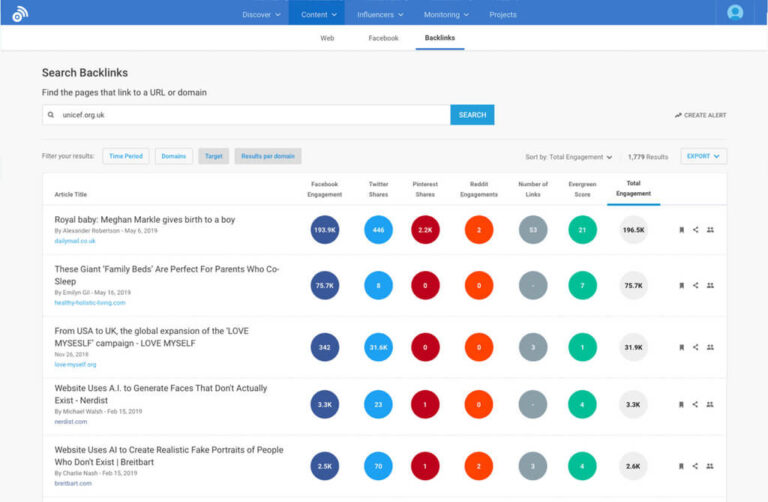
Image Source – Buzzsumo
#6. Outreach
Social media Outreach helps to contact relevant and authentic websites to link to your content or collaborate. Promoting your content and demonstrating its value to potential link partners is essential.
With the help of social media, outreach can help you increase your exposure and improve organic search rankings and traffic Social media outreach can also build trust and authority in your niche and establish long-term relationships with influencers and peers.
Some tips and best practices for link-building LinkedIn and Twitter outreach that can help you earn more links and boost your rankings,
-
Targeted following on both LinkedIn and Twitter
-
Participating in conversations
-
Establishing Thought leadership
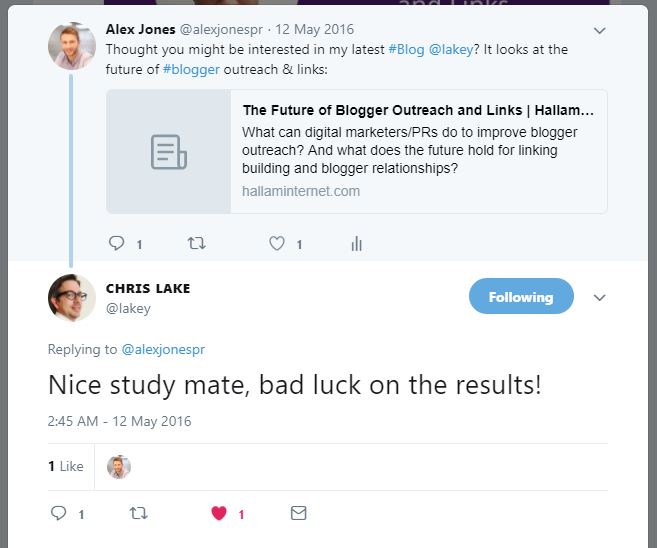
Image Source – hallaminternet
Advantages of Using Social media for link building
Increased visibility: Social media platforms help to increase the visibility of your content and website.
Building relationships: Social media can help you connect with other websites and their owners.
Build authority: Building a solid social media presence can help you establish yourself as an authority within your industry to improve your chances of getting quality backlinks.
Targeted outreach: Social media allows you to target specific audiences, making reaching people interested in your content more accessible.
Increases engagement: While people engage with social media posts, it can increase your visibility.
Final Thoughts
Social media has become a super valuable tool for link-building. By sharing content on social platforms such as Facebook, Twitter, and LinkedIn, businesses can attract more traffic to their website. Social media allows businesses to build relationships with other websites by engaging with them on social channels. Additionally, social media influences how search engines rank websites, with platforms such as Facebook and Twitter potentially significantly impacting search engine rankings. When used effectively, social media can be crucial in business link-building.
